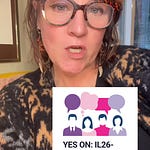(The below transcript is mostly faithful to the video with some editing for readability.)
Intro
Instinct SOS: Strengthening Our Safeguards is a weekly deep dive about our different instinctual responses. Instincts: all animals have them, humans included. Our instincts—the ones we often ignore—are hardwired for survival. Being social creatures, humans live in a world that is constantly trying to hijack our instincts through advertising, social media, technology, food, and pharma, understanding why and how our instincts function is vital to staying safe and sane.
Reasons I’m doing this series:
I aim to underscore and revalue the importance of our instincts. I hear many times that humans have evolved beyond our “base instincts” a phrasing that implies that our instincts are no longer necessary and that our instincts are somehow leading us down an immoral path. Just the opposite is true. Our instincts are the basis of all our survival and safeguarding capacities. Every animal is born with instinctual capacities to survive. Also, our instincts are actually the basis of all our highest moral values, empathy, justice, and integrity in communication all come from instinctual responses. I’ll do an episode on this later.
As I said above, humans are social creatures, we are herd animals, and because of this we have an instinctual need to fit in with the herd (this is another episode), but because of this certain other instincts can be hijacked in order to serve our need to fit in with the herd. If we remain unconscious of our instincts, then it is much easier to allow them to be hijacked. In order to be able to utilize them for our highest safeguarding needs, we need to understand where they come from, how they function, and how they protect us.
In the rest of the animal kingdom, all other animals teach their young how to hone their adaptive instincts for survival. Humans are the only animal that actively teaches their young to ignore, dissociate from, and dismiss their primal survival instincts. With this series, I hope that you’ll walk away with a deeper understanding of why and how each of our instincts remain valuable tools in our safety arsenal, how to recognize when your instincts are being hijacked, and how to better utilize your instincts to stay both safe and sane.
Episode 1. Sex recognition
Sex recognition is arguably the most crucial survival instinct across animal species, as it directly impacts reproduction, social structures, and the perpetuation of genetic material. For survival, an animal’s ability to correctly identify the sex of other individuals is fundamental for ensuring effective mating and protecting young from infanticidal males who are attempting to assure their own reproductive success. So it plays into both the procreation drive that all species have, as well as survival from predatory males.
In humans sexual violence is another factor and statistics collected by the FBI, DOJ, WHO, RAINN, and other orgs show that men are the predominant perpetrators of sex based violence while women/girls are the predominant victims.
So, for all of these reasons, sex recognition is primal for our survival.
In each episode that I cover:
I'm going to talk about the instinct.
I'm also going to cover how that particular instinct is being hijacked by culture.
And I'm going to talk about how to safeguard that instinct against hijacking for
our highest safety and survival.
Discussion topics
How do humans do sex recognition
Where and how is our sex recognition instinct being hijacked
How can we safeguard against this hijacking for our own safety and survival needs
How do humans recognize sex
Humans are a sexually dimorphic species, so the males and the females of our species look different. To differentiate between the sexes we use all kinds of cues, mainly visual, but also auditory, and even olfactory. So sight, sound, and scent all help us recognize sex. It’s not any one thing that is standing out to us, but all these things are working together to form patterns. Humans, even more than most animals, are good at pattern recognition. And these cues are all working on us on a level below conscious awareness. Infants as young as 3 months old, other animals can do this immediately after birth. Also, to underscore that sex recognition is not simply visual, studies tell us that blind people recognize sex using vocal and olfactory cues that include not just the pitch of the voice, but speech patterns, footfalls, and size cues.
Humans, with our giant prefrontal cortex, are very good at pattern recognition. Pattern recognition is happening at a level below our conscious awareness. All of these things we are processing on a physical level before we can think about them. Infants as young as three months old can recognize sex. Other animals can do it immediately after birth. I’m naming this to underscore that sex recognition is very primal.
Also, to underscore that sex recognition is not simply visual, studies tell us that, of course, we know blind people can recognize sex, and they do this using different vocal and olfactory cues. These include not just the pitch or the tone of the voice, but also speech patterns. They also use footfalls and size cues. So there’s all kinds of pattern recognition skills that are happening regularly in order for us to pick up on sex.
Hijacking and Gaslighting about Sex Recognition
In the age of transgenderism, we are facing a lot of propaganda that says that humans can’t recognize sex without, quote unquote, looking at someone’s genitals. Now, this assertion is a form of gaslighting that strikes me as utterly ridiculous. It’s ridiculous to think that other animals can recognize one another for the purposes of procreation, but to imply that humans are somehow bad at this when in fact, we are highly, highly expert at this. There is a study about sexual differentiation called Sex Discrimination: How Do We Tell the Difference Between Male and Female Faces? It tells us people that people are remarkably accurate, approaching ceiling, at deciding whether faces are male or female, even when cues from hairstyle, makeup, or facial hair are minimized. This is to say that we are, we are very, very, very good at this skill.
And there are those who are trying to hijack this innate instinct…
People like Jeffrey Marsh. Many of you will know who he is. He is a very big social media influencer and talks a lot about transgenderism in general. He also tells kids how to go, quote-unquote, no contact from their parents. But here is a video where he is specifically gaslighting about sex. In the video, he theatrically denies the reality of sex recognition, saying, "I look like a man. I’m not one," attempting to discredit the very visible evidence of his male characteristics. This kind of denial is predatory as it seeks to undermine our inherent ability to recognize and trust what we perceive. Marsh's antics are an exaggerated example of this gaslighting, but they reflect a broader societal trend of challenging sex recognition, which is a fundamental safeguarding instinct.
Jeffrey is using all these different things to get us to deny what is in front of our eyes, that we see a man. He even says that he may look like a man to us, but that he is not one, when he very clearly is a man. Everything about his characteristic, his mannerism, his look, all of that tells us that he is a man, and we're very accurate at doing it. It doesn't matter what he says or doesn't say, we can see with our own eyes here, with our own ears, that he is a man. And to gaslight others about sex recognition is predatory.
Why Sex Recognition is a Safeguarding Capacity
These are all books about safeguarding. And they talk about safeguarding. This is my favorite one. I talk about this book all the time. The Gift of Fear by Gavin DeBecker. Please read it if you haven't. And this all is going to talk about sex recognition when it comes to sex-based crimes. And Gavin DeBecker has a great quote that I want to read for everyone. And he is specifically here talking to a woman who is getting ridicule and sarcasm from her boyfriend whenever she discusses her fear for her own safety. And Gavin DeBecker says, "Tell him that your survival instinct is a gift from nature that knows a lot more about your safety than he does. And tell him that nature does not require his approval." And that is exactly what I would tell Jeffrey Marsh. Nature does not require your approval. It doesn't matter what your claimed identity is. You are physically a man. You are a man through and through.
The Gift of Fear, talks about sex recognition when it comes to safety and survival. This book, Predators, Pedophiles, Rapists, and Other Sex Offenders, Who They Are, How They Operate, How We Can Protect Ourselves and Our Children, talks about the sex differences when it comes to sex-based crime and sex-based safeguarding. This book, Protecting Your Child from Sexual Abuse: What You Need to Know to Keep Your Kids Safe, talks about sex recognition when it comes to sex-based crime and sex-based safeguarding. This book, The Gift of Violence: Practical Knowledge for Surviving and Thriving in a Dangerous World, talks about the sexes when it comes to sex-based crime. This book, this is also by Gavin DeBecker, Protecting the Gift: Keeping Children and Teenagers Safe and Parents Sane, talks about sex recognition when it comes to sex-based crime. This book, it's a little academic, but worth it if you feel like it, Sexual Grooming: Integrating Research, Practice, Prevention, and Policy, talks about sex and sex recognition when it comes to sex-based crime. And The Ellipsis Manual: Analysis and Engineering of Human Behavior talks about sex recognition when it comes to sex-based crime. And a lot of these people are, you know, these are people who deal with stalking cases, FBI profilers. These are some of the top experts when it comes to safeguarding. And all of them are experts talking about the importance of this.
So this is an image that I often like to share. As you can see, it's a Little Red Riding Hood image. And I often use Little Red Riding Hood. It is a 16th century fairy tale that we have. And ultimately, it is a very classic tale about safeguarding. Not only is it a tale that tells us not to trust the charming stranger, it is also a tale that teaches us how to trust our instincts and what can go wrong when we do not trust our instincts.
In Little Red Riding Hood, what we really see happening for her is that her instincts, her direct sense perceptions of the situation are accurate. We know in the story in this moment that is pictured here in this image, this is the moment that in the classic tale she is saying to him, "You know, but grandma, what big eyes you have, what big ears you have, what big teeth you have." And he is saying, "You know, the better to see you with, the better to hear you with, and then the better to eat you with." So then she gets eaten. That's the mistake that she makes. But what we sometimes miss is that her direct instincts and sense perceptions about the situation are accurate. She accurately sees him for who he is. She sees the teeth. She sees the eyes. She sees the ears. She sees the wolf. He is not fooling her. Her instincts are accurate, but what happens is that she allows him to rationalize her out of her own instincts. And in this way, this is how she gets hurt. This is the lesson of the story. When you disregard your own judgment, your own instincts, this is how you get hurt.
Gavin DeBecker talks about that in his book, in The Gift of Fear. He talks about what happens when you rationalize yourself out of your instincts. And humans are the only animal that does this. Other animals, if a rabbit sees a fox, the rabbit doesn't say to itself, "Well, it could be a really nice fox. Maybe the fox means me no harm. I have never met this fox before. Maybe this is a different kind of fox." No, the rabbit runs. And humans will use rationalizations to talk themselves out of their instincts and out of their intuition. And what is happening with this extra marketing with transgenderism is it is a kind of a rationalization that we are supposed to use in order to deny our instincts. We keep getting told, you know, that there's more than one sex, which is not, sorry, more than, there is more than one sex, that there's more than two sexes. There are not. There's two potential paths. You're either on one path or the other. Even if you have a developmental disorder, you're still having a disorder on one path or a disorder on the other path. There's two paths. There's a path towards making eggs or there's a path towards making sperm. There's no other potential paths. So we keep getting gaslit, I guess, about that. And we are also meant to use the identities of transgenderism to rationalize ourselves against recognizing sex. So this is a corruption of our primal safeguarding instinct.
Sex Recognition is a Part of Healthy Boundaries and Bodily Autonomy
Sex recognition is not just important in terms of sex-based crimes, but it is important for children especially. So children, when they are around two, three, in this age set, they are going through a language acquisition phase. This is also a will-building phase. This is also an internal authority-building phase. They are learning to trust their bodies to tell them the truth about the world. And it is what we call naming and claiming. Sometimes we call it see and say. So they see something in the world. They say what they see. "Mommy, you know, I see a tree." And the mom says, "Yes, baby, that's a tree." The child says, "You know, daddy, that's a bird." And the father says, "Yes, you know, that is a bird." So they are learning to be able to trust their bodies to tell them the truth about the world.
This is the ultimate way that we learn how to trust our body's signals, to trust ourselves, to begin trusting our authority. So the fact that the ideology of transgenderism is being taught in our schools, where kids are being taught by their teachers, "No, you know, I'm not a boy, you know, I'm a man," or "Kid so-and-so is not a girl, kid so-and-so is a boy," this is sending kids the signal that they cannot trust their bodies to tell them the truth about the world. So this is a step of dissociation. It leads them not to trust their bodies. And kids who do not trust the signals of their own bodies, they are vulnerable to further predation. And all of these books, all of these books that are about grooming, safeguarding, predators, pedophiles, all of these people who are predators specifically prey on the vulnerable. Those who are not grounded in their sense of self make much easier targets.
And I'm going to tell a little story here. This is the story of the empty house. And this is a very good metaphor to talk about safeguarding. So when we are in our instincts, when we are embodied, okay, this is a story about embodiment. This is one of the things that I'm always talking about in terms of instincts. To be in our embodiment is to be in our instincts. And when we are embodied, we are safe. When we are dissociated, we are unsafe. So the metaphor goes like this. At the end of the block, there is an empty house. That house is vacant. It's got a massive barbed wire fence around it, you know, so that nobody will screw with the house. The barbed wire fence goes all the way around the house. It's 10 feet tall. It has the twisty wire barbed wire. Everyone can see that it's got this barrier around it. But still, people let their dogs take a crap in front of the house. Kids throw empty bottles into the, you know, into the windows and break the windows. Drug dealers, they, you know, cut a hole in the fence, and they break in and break in the house and hold their deals there because everyone can see that the house is vacant.
Down the street, there is a house. It has no fence. There's not even a white picket fence. There's no fence. It's got a beautiful yard, though. The lights are on. There's smoke coming out of the chimney. There's curtains in the window. There's beautiful cooking smells coming out. No one breaks into the house. No one does drug deals in the house. No one throws bottles through the windows of the house because everyone can see that the house is fully occupied. Now, this is a metaphor to say when we are fully occupied, when we are in ourselves, it can be sensed. People see this about us. They leave us alone. When we are dissociated from ourselves, when we are dissociated from our instincts, others can see that we are vacant ourselves. And that they can screw with us. So it doesn't matter how many barriers we put around. It doesn't matter how much we tell someone or get loud or get big or tell them to leave us alone. Predators can sense who is vacant and who is not. And these books talk all about that. That is exactly what they can see.
And all of this, I want to talk about one other thing as it applies to sex recognition. Because once I say this empty house metaphor, I talk about Little Red Riding Hood to say that, you know, as I said in the beginning, our sex recognition skill is the most urgent, primal, important safeguarding capacity that we have. This instinct is really the root of all other instincts. Everything sort of flows from there for any sexually dimorphic species and especially humans. So this instinct is getting hijacked by men claiming that they're women, by teachers saying that you cannot know if you are a boy or a girl. You can't know who else is a boy and a girl. And it's also being hijacked by incorrect pronoun usage.
Pronouns are not Benign, Stroop Effect
Pronouns are not benign. And I talk about this on my social media a lot. So when we use inaccurate sex-based pronouns, it confuses. And I want to point to an article that many of you may know by Fair Play for Women called Pronouns Are Rohypnol. I am going to bring that screen up right now. So this is a really great article, and it talks about the importance of using accurate sex-based pronouns. But it talks about a thing that I want to get into, and this is called the Stroop Effect. So you can see that there are a bunch of words here, and they're different. The orange word is written in pink. I see even I'm doing it. The word blue is written in green. The word green is written in blue. And this causes a kind of cognitive disruption known as the Stroop Effect. It's very hard to ignore the color of the word while you are saying the word. So it causes a disruption in cognition. It causes you to have a pause before you are able to say the accurate thing. And this kind of pause ultimately introduces a disruption in our safeguarding.
And this kind of pause ultimately introduces a disruption in our safeguarding. So when this disruption is happening at the level of sex, what is going on is when we are seeing a man and then we are meant to say the words, she or her, or call him a quote-unquote "trans woman." And this is causing a cognitive disruption. So let's say I go into a woman's intimate space, into a locker room, and a man comes in. Now, at any other point in human history, I rely on my instincts. I scream. I say, "There's a man in the room." And I warn all the other women, and we scream, and we call a manager, and we band together to get him out. And this is a response because we responded with our fright to get the man out.
But when there is this cognitive disruption of not knowing, it creates a confusion where there's none. I still see a man when the man comes into the room. But now with this cognitive disruption, it creates an interruption between my ability to respond with my own survival skills. Because now I am in a thinking place. I'm no longer in an embodied responding place. I'm thinking, "Why is this man here? Does he claim to be a woman? What is his mental state? What is he wearing?" So I'm making all kinds of mental judgments about his psychological state of being, about his style choices, and I'm not just responding to there being a man in the space. I am having a cognitive disruption, and those pronouns also introduce a cognitive disruption.
Now, for an adult, this cognitive disruption is a problem, but for a child, it is an especial disruption because, again, it tells them that they cannot trust the authority of their bodies, and it tells them they can't trust what they see in front of their face. So it is not a benign situation. It is a cultural situation that is causing exponential harm. And the worst of the harm is this, and I want you to really sit with this. Because this is being taught in our schools, across almost all public schools and across almost all Western countries, this is creating a situation in which all of our youth are being groomed to deny their most primal instinct for sex recognition. And because so many of them are being put on puberty blockers and hormone treatments to disguise their secondary sex characteristics, they are being groomed into a situation where they will no longer be able to recognize or speak about sex for the purposes of procreation and for the purposes of protection.
It is my analysis that this is a human rights atrocity on a massive scale because this is our most primal safeguarding tool that we have. So to dissociate us from this tool is to dissociate us from our humanity. Jennifer Billick talks about this. It is to dissociate us from all of nature, but it is to keep us from being able to act on our instinctual responses to protect ourselves and keep us safe. And it creates an environment for kids where they are vulnerable to future predation. So for all these reasons, our sex recognition instinct is incredibly important, both for our safety and also for our sanity.
If you have comments, please make comments. Please subscribe. Please ask for more if there are any instincts that you would like to hear about more in depth, please share that with me. Thank you so much for your time, and I look forward to seeing you next week. Thank you.
References:
1. Research on Instincts and Survival Responses:
De Becker, Gavin. The Gift of Fear: Survival Signals That Protect Us from Violence. Dell Publishing, 1998.
This book is a widely respected source on human instincts and how they play a crucial role in personal safety and violence prevention. It supports the essay’s points about trusting and valuing instinctual responses for safeguarding.
2. Studies on Sex Recognition and Pattern Recognition:
Bruce, Vicki, and Andy Young. Face Perception. Psychology Press, 1998.
Bruce and Young’s work on face perception discusses the processes involved in recognizing and differentiating between male and female faces, providing scientific insight into sex recognition as a primal instinct.
Russell, R., Duchaine, B., and Nakayama, K. "Super-recognizers in Human Face Processing." Psychological Science, vol. 20, no. 10, 2009, pp. 1108-1115.
This article explains high levels of human facial recognition abilities and could support the argument that humans possess finely tuned pattern recognition skills, which assist in identifying sex and social cues.
3. Studies on Gender Recognition in Early Development:
Quinn, Paul C., et al. "Representation of Gender Information by Infants." Psychological Science, vol. 13, no. 6, 2002, pp. 499-502.
This study examines how infants can differentiate gender, supporting the essay’s claim that sex recognition is a deeply ingrained instinct, evident even in young children.
4. Impact of Media and Socialization on Instincts:
Gerbner, George, et al. "Growing Up with Television: The Cultivation Perspective." In Media Effects: Advances in Theory and Research, edited by Jennings Bryant and Dolf Zillmann, Lawrence Erlbaum Associates, 2002, pp. 43-67.
This text provides foundational insights into how media shapes perceptions, which can be linked to the discussion of societal influences hijacking natural instincts.
5. Cognitive Disruption and the Stroop Effect:
MacLeod, Colin M. "The Stroop Task: The 'Gold Standard' of Attentional Measures." Journal of Experimental Psychology: General, vol. 121, no. 1, 1991, pp. 12-14.
MacLeod’s work on the Stroop effect would be helpful in explaining cognitive disruption when instinctual recognition conflicts with societal expectations or misleading cues.
6. Research on Sex, Instincts, and Safety:
Felson, Richard B., and Paul-Philippe Pare. "Gender and the Victim’s Experience with the Criminal Justice System." Social Forces, vol. 85, no. 4, 2007, pp. 1727-1752.
This paper provides data on gender-based violence and the significance of instinctual safety responses, supporting the essay's emphasis on safeguarding and instinct as a protective mechanism.
7. Philosophical and Evolutionary Perspectives on Instincts:
Lorenz, Konrad. On Aggression. Harcourt, 1966.
Lorenz’s classic work on instincts in animals and humans discusses aggression and survival, providing a philosophical context that aligns with the essay's theme of instincts as fundamental to safeguarding.
8. Research on the Influence of Education and Identity on Child Development:
Bandura, Albert. Social Foundations of Thought and Action: A Social Cognitive Theory. Prentice-Hall, 1986.
Bandura’s theories on social learning offer insight into how children’s perceptions are influenced by their environments, supporting the essay’s claims about the impacts of educational narratives on instinctual development.
David, Henry P., and Dolores B. Hetherington. Gender Differences in Development. American Psychological Association, 1986.
This source explores the role of gender identity and recognition in development, reinforcing the essay’s discussion on how early teachings on gender can influence children’s instinctual safeguards.
Bradbury & Vehrencamp, 2011, Principles of Animal Communication.
Hausfater, G., & Hrdy, S. B. (1984). Infanticide: Comparative and Evolutionary Perspectives. Aldine Publishing Company.











